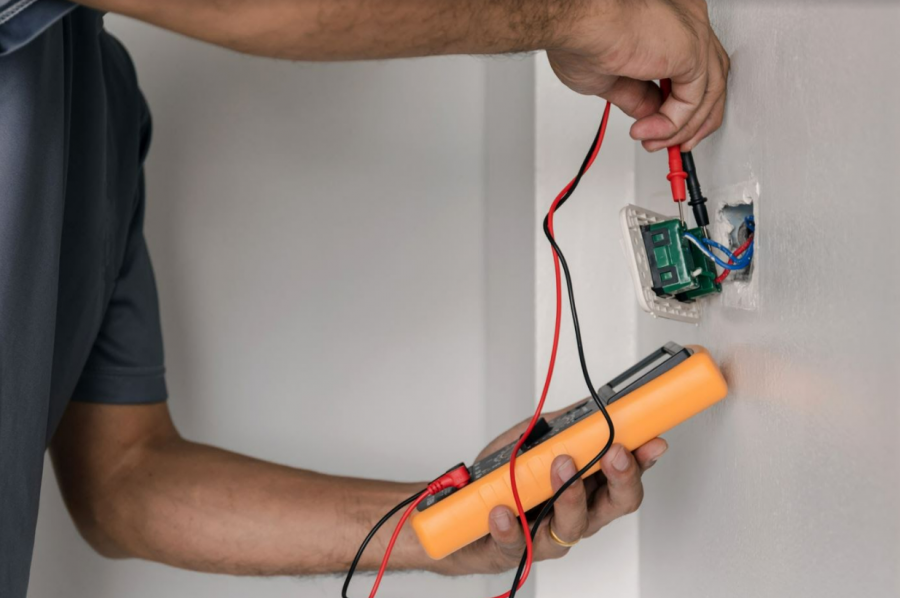
A home inspection can identify any underlying issues with the property that might have gone previously unnoticed or undisclosed by the seller. Beyond their practical value in terms of uncovering problems, almost all new home buyers seeking a mortgage must get a home inspection first. Home inspectors look for basic functionality. Do the appliances work? Is everything in order? Are there any major structural flaws?
Although catching every possible issue is likely impossible, contracting with the following groups of professionals before your home inspection can put you in the best position possible to pass with flying colors.
Residential Electrical Contractor
Electrical problems are one of the leading causes of property damages to residential homes. Problems that aren’t taken care of can lead to damaged appliances, dim or flickering lights, electrocution, power outages, and fires. Because the consequences can be so serious, electrical problems are a key aspect of what your home inspector will be on the lookout for.
Therefore, it’s imperative that your house’s electrical system is in top shape before they visit. An experienced residential electrical contractor can diagnose any issues with the electrical wiring of your property before the inspector does. If necessary, they can take corrective action to fix the problems. Likely, these will be relatively small fixes. However, if you have an older house or other serious issues, it may become a bigger task.
Residential Plumbers
There’s a lot that can go wrong with the plumbing in your home. Because so much of the plumbing is hidden in your walls, ceilings, and floors, problems may accumulate for a long time before they become noticeable. A problem as simple as a small crack in an old pipe can lead to water damage, structural damage, mold, and other significant issues throughout your home. The home inspector is guaranteed to look at your plumbing, so you can avoid any snags by making sure your pipes are in order prior to inspection day.
Your plumber will check all the sinks and toilets to make sure they are functioning adequately. They will also take a look at your hot water heater and inspect your outdoor pipes to ensure they are resilient to extreme weather conditions. If the home has a septic tank, you may also want a septic tank inspection.
HVAC Professionals
HVAC is an acronym that stands for “heating, ventilation, and air-conditioning” system. More and more homebuyers these days are putting working air conditioning at the top of their list of priorities. Your heating and cooling systems can be a huge liability if they don’t work properly, so investing in a professional contractor for an initial inspection is a good idea.
During the inspection, the contractor can also give you an idea of how long you have until these systems require upkeep. This is another vital bit of information for long-term homeowners to help anticipate future expenses. Having this type of information available for potential homebuyers can help them make their purchasing decision.
Roofers
Replacing a roof is an enormous expense. However, it can be an important investment. Damaged roofs can lead to pest problems, low energy efficiency, water damage, structural damage, and many other problems. If the home inspector catches any damage on the property’s roof, you’re likely going to have to make a lot of repairs before any buyer will agree to make an offer. If you don’t want to make the repairs, the buyer may negotiate for a significantly lower price so that they can fix the roof themselves. In the event that a roofer does diagnose any issues, it’s always a good idea to get a second or even third opinion before moving forward with any work.
Pest Inspection
While many home inspection services will also look for signs of termites, carpenter ants, and other pest damage, this isn’t a guarantee. If the service you’ve hired isn’t qualified to also inspect for pest infestation, it’s essential that you get an exterminator out to look over the home for signs that might otherwise be missed. For instance, you could have an infestation of bees in your attic, crawl space, or walls. It’s possible to be totally unaware of this problem until honey starts leaking out of the walls and ceiling on a hot summer day.
Full Inspection
Of course, even after all the other professionals come through and do their own checks and repairs, you’ll have to contact an inspector for the final inspection. The average person can’t tell by looking at a home whether there is anything amiss. There may be code violations or electrical issues that will only be revealed after a full inspection by one of your local home inspection services. Many people make the mistake of assuming that the appraisal inspection will cover this. While the appraiser may catch egregious issues, there are many things that they might not notice. With a full inspection, you’ll be best able to ensure that there is nothing wrong with your house so that the sale can proceed.
If you’re planning to sell your house, you need to be ready for the home inspection. The problems that come up during this inspection will directly affect the price you’ll be able to get for your house. If there are enough serious issues, you may struggle to sell the house at all. After all, moving is difficult enough. Very few buyers will want to have to deal with expensive repairs on top of that. Fortunately, when you enlist the help of these residential home professionals, you’ll be ready to pass your home inspection with ease.
